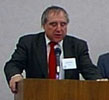Global
Haiku Festival Speeches
April
14-15, 2000
Millikin University
|
|
 Saturday
was a very full day of academic presentations on the history
of haiku from various parts of the world. Saturday
was a very full day of academic presentations on the history
of haiku from various parts of the world.
The
first presentation, "Haiku in Germany: The Difficult
Path of an Exotic Form of Poetry into a Foreign Literature,"
was by Horst Ludwig, Associate Professor of German
at Gustavus Aldolphus College in St. Peter, Minnesota.
Yoshiko
Yoshino, leader of the Hoshi haiku group in Matsuyama,
could not attend the festival, but she sent a message, "Haiku
Mind" which was presented by Emiko Miyashita. Mrs.
Yoshino also provided a generous gift to help support Global
Haiku Festival and future Global Haiku studies at Millikin
University.
 In
his presentation, "Nature, Africa, and Richard Wright's
Haiku" Yoshinobu Hakutani, Professor of English
at Kent State University, discussed Richard Wright's unique
perspectives and motives for writing English-language haiku. In
his presentation, "Nature, Africa, and Richard Wright's
Haiku" Yoshinobu Hakutani, Professor of English
at Kent State University, discussed Richard Wright's unique
perspectives and motives for writing English-language haiku.
The
next presentation on the "Origins and Development of
French Language Haiku in the Beginning of the 20th Century"
was by Bertrand Agostini, Associate Professor of
English at Ecole Superieure d'Agriculture and Universite
Catholique de l'Ouest in Angers, France.
|
|
 Lee
Gurga, Associate Editor of Modern Haiku spoke "Toward
an Aesthetic for English-language Haiku" which emphasized
the importance of the seasonal element in haiku and introduced
the concept of "zappai" as a label for psuedo-haiku
verses written in 5-7-5 but lacking essential elements of
the haiku experience. Lee
Gurga, Associate Editor of Modern Haiku spoke "Toward
an Aesthetic for English-language Haiku" which emphasized
the importance of the seasonal element in haiku and introduced
the concept of "zappai" as a label for psuedo-haiku
verses written in 5-7-5 but lacking essential elements of
the haiku experience.
After
lunch, avant-garde haiku poet Ban'ya Natsuishi, Professor
of Law at Meiji University in Tokyo, spoke about the variety
of contemporary Japanese haiku moving to more international
or global perspectives.
In his
presentation, "A New Trend Towards the World Haiku
in Contemporary Japanese Haiku" Ban'ya argued that
assumptions about shared allusions and literary traditions
are changing the future prospects of haiku.
George
Swede, Professor of psychology at Ryerson Polytechnic
University in Toronto, spoke about "The Haiku in Canada:
Its History and Current Status"
|
|
 This
speech was followed by a presentation on Japanese perspectives
of English-language haiku by Ikuyo Yoshimura, Professor
of English at Asahi University in Gifu. This
speech was followed by a presentation on Japanese perspectives
of English-language haiku by Ikuyo Yoshimura, Professor
of English at Asahi University in Gifu.  She
discussed three kinds of Japanese reactions to haiku written
in English in her talk titled, "The Reception of English-language
Haiku in Japan." She
discussed three kinds of Japanese reactions to haiku written
in English in her talk titled, "The Reception of English-language
Haiku in Japan."
The
marathon schedule of presentations continued with a very
comprehensive talk by David Cobb, President of the
British Haiku Society on "National Haiku and Global
Haiku: A British Perspective." David Cobb presented
an overview of the British haiku scene and addressed the
dilemma all haiku communities are aware of--how to reconcile
the peculiarities of haiku as developed within a particular
nation-cultural context with the demands of a poetic genre
that bids to be comprehensible and cohesive on a worldwide
scale.
|
|
 Following
this report from the British haiku scene, Jim Kacian,
editor of Frogpond, shared his recent work on "Balkan
Haiku: A Chronological Survey" which was a very encouraging
report of a long-standing Western tradition of haiku activity
with strong contemporary readership. Following
this report from the British haiku scene, Jim Kacian,
editor of Frogpond, shared his recent work on "Balkan
Haiku: A Chronological Survey" which was a very encouraging
report of a long-standing Western tradition of haiku activity
with strong contemporary readership.
At the
served banquet Saturday evening, Peter Mortimer,
publisher of Iron Press, shared his perspectives on publishing
haiku books in the United Kingdom. He is the publisher of
Global Haiku: 25 Poets
World-wide which was celebrated with a reading
that evening sharing the work from seven of the 25 poets
in the anthology.
|
|
 Following
the banquet, the keynote speaker William J. Higginson
spoke on "Global Haiku: Context, Evolution, and Witness."
In this address he reviewed the history and growth of an
international haiku community, with a look to current trends
on the web. More on keynote. Following
the banquet, the keynote speaker William J. Higginson
spoke on "Global Haiku: Context, Evolution, and Witness."
In this address he reviewed the history and growth of an
international haiku community, with a look to current trends
on the web. More on keynote.
Also
Saturday evening we had an open-microphone haiku reading
with several Millikin students and members of the public
attending, followed by our late-night presentation on by
Professor Bertrand Agostini entitled, "In the
Heart of Zen, in the Heart of the World: Jack Kerouac and
Haiku."
Early
Sunday morning at 7:30 a.m. a dedicated group of about 25
gathered at Pilling Chapel on Millikin's campus for two
presentations on Pure Land Buddhism and Issa's haiku by
John Martone, Professor of English at Eastern Illinois
University in Charleston, Illinois.
The
second talk Sunday morning was by David Lanoue, Professor
of English at Xavier University of Louisiana. One sleepy-eyed
Millikin student had pulled an all-nighter at a local prom
dance, but he didn't want to miss the presentations on his
favorite Japanese haiku poet, Issa.
|
|